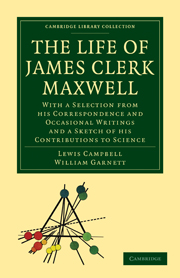 The Life of James Clerk Maxwell
The Life of James Clerk Maxwell Book contents
- Frontmatter
- PREFACE
- Contents
- LIST OF ILLUSTRATIONS
- PART I BIOGRAPHICAL OUTLINE
- CHAPTER I BIRTH AND PARENTAGE
- Note.—The Clerks of Penicuik and Maxwells of Middlebie
- CHAPTER II GLENLAIR—CHILDHOOD—1831-1841
- CHAPTER III BOYHOOD—1841-1844
- CHAPTER IV ADOLESCENCE—1844-1847
- Note.—Oval and Meloid
- CHAPTER V OPENING MANHOOD—1847-1850
- CHAPTER VI UNDERGRADUATE LIFE AT CAMBRIDGE—1850-1854
- CHAPTER VII BACHELOR-SCHOLAR AND FELLOW OF TRINITY—1854-1856
- CHAPTER VIII ESSAYS AT CAMBRIDGE—1853-1856
- CHAPTER IX DEATH OF HIS FATHER—PROFESSORSHIP AT ABERDEEN—1856-1857
- CHAPTER X ABERDEEN—MARRIAGE—1857-1860
- CHAPTER XI KING'S COLLEGE, LONDON—GLENLAIR—1860-1870
- CHAPTER XII CAMBRIDGE—1871-1879
- CHAPTER XIII ILLNESS AND DEATH—1879
- CHAPTER XIV LAST ESSAYS AT CAMBRIDGE
- PART II CONTRIBUTIONS TO SCIENCE
- PART III POEMS
- INDEX
- Plate section
CHAPTER VII - BACHELOR-SCHOLAR AND FELLOW OF TRINITY—1854-1856
Published online by Cambridge University Press: 05 July 2011
- Frontmatter
- PREFACE
- Contents
- LIST OF ILLUSTRATIONS
- PART I BIOGRAPHICAL OUTLINE
- CHAPTER I BIRTH AND PARENTAGE
- Note.—The Clerks of Penicuik and Maxwells of Middlebie
- CHAPTER II GLENLAIR—CHILDHOOD—1831-1841
- CHAPTER III BOYHOOD—1841-1844
- CHAPTER IV ADOLESCENCE—1844-1847
- Note.—Oval and Meloid
- CHAPTER V OPENING MANHOOD—1847-1850
- CHAPTER VI UNDERGRADUATE LIFE AT CAMBRIDGE—1850-1854
- CHAPTER VII BACHELOR-SCHOLAR AND FELLOW OF TRINITY—1854-1856
- CHAPTER VIII ESSAYS AT CAMBRIDGE—1853-1856
- CHAPTER IX DEATH OF HIS FATHER—PROFESSORSHIP AT ABERDEEN—1856-1857
- CHAPTER X ABERDEEN—MARRIAGE—1857-1860
- CHAPTER XI KING'S COLLEGE, LONDON—GLENLAIR—1860-1870
- CHAPTER XII CAMBRIDGE—1871-1879
- CHAPTER XIII ILLNESS AND DEATH—1879
- CHAPTER XIV LAST ESSAYS AT CAMBRIDGE
- PART II CONTRIBUTIONS TO SCIENCE
- PART III POEMS
- INDEX
- Plate section
Summary
“In the Main of Light.”
1845. Æt. 22
James Clerk Maxwell's position as Second Wrangler and equal Smith's Prizeman, gave deep satisfaction to his friends in Edinburgh. Any lurking wish that he had been Senior was silenced by the examples of William Thomson and Charles Mackenzie, as others have been since consoled with the examples of Maxwell and Clifford. His father was persuaded by Miss Cay to sit for his portrait to Sir John Watson Gordon, as a gift of lasting value to his son. James was not indifferent to these reflex aspects of his success; but the chief interest of the moment to him undoubtedly was that he was now free to prosecute his life-career, and to use his newly-whetted instruments in resuming his original investigations. His leisure was not absolute, for he took pupils as a matter of course, and the Trinity Fellowship was only to be gained by examination. But his freedom was as great as he himself desired, and it is a fact worthy of attention from “researchers,” that Maxwell, with his heart fully set on physical inquiries, engaged of his own accord in teaching, undertook the task of examining Cheltenham College, and submitted to the routine which belonged to his position at Cambridge. As a foretaste of delights in store, he had spent the evenings of the Senate-house days in (physico-) magnetic séances with his friends. But when actually emancipated he seems to have reverted principally at first to his beloved Optics.
- Type
- Chapter
- Information
- The Life of James Clerk MaxwellWith a Selection from his Correspondence and Occasional Writings and a Sketch of his Contributions to Science, pp. 197 - 222Publisher: Cambridge University PressPrint publication year: 2010First published in: 1882
